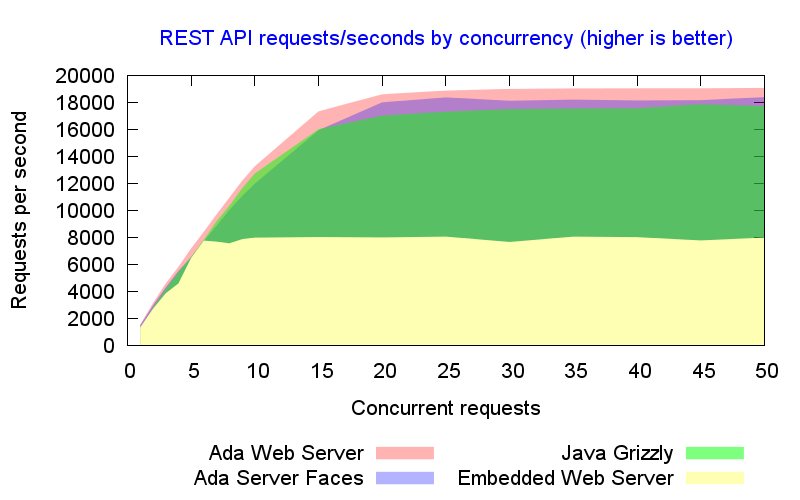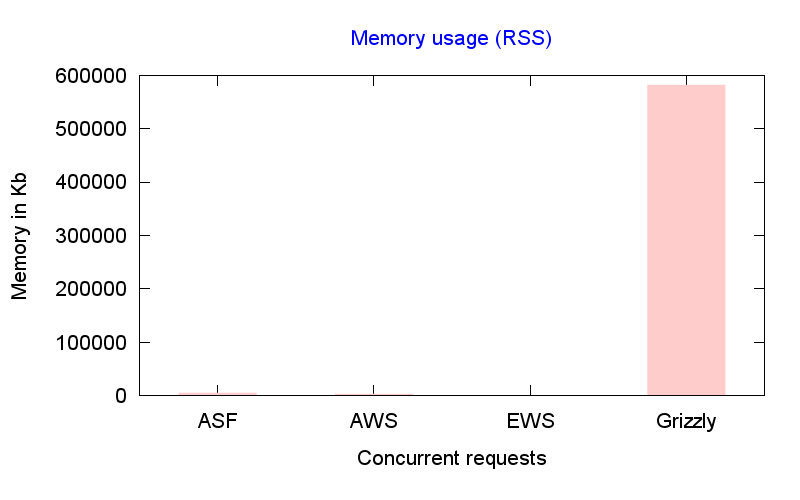Arcadius Ahouansou from Menelic.com made an interesting benchmark to compare several Java Web servers: Java REST API Benchmark: Tomcat vs Jetty vs Grizzly vs Undertow, Round 3. His benchmark is not as broad as the TechEmpower Benchmark but it has the merit to be simple to understand and it can be executed very easily by everyone. I decided to make a similar benchmark for Ada Web servers with the same REST API so that it would be possible to compare Ada and Java implementations.
Rest API Benchmark comparison between Ada and Java
By Stephane Carrez2017-03-21 22:55:00 3 comments
The goal is to benchmark the following servers and have an idea of how they compare with each others:
The first three are implemented in Ada and the last one in Java.
REST Server Implementation
The implementation is different for each server but they all implement the same REST GET operation accessible from the /api base URL. They return the same JSON content:
{"greeting":"Hello World!"}
Below is an extract of the server implementation for each server.
AWS Rest API Server
function Get_Api (Request : in AWS.Status.Data) return AWS.Response.Data is
begin
return AWS.Response.Build ("application/json", "{""greeting"":""Hello World!""}");
end Get_Api;
ASF Rest API Server
procedure Get (Req : in out ASF.Rest.Request'Class;
Reply : in out ASF.Rest.Response'Class;
Stream : in out ASF.Rest.Output_Stream'Class) is
begin
Stream.Start_Document;
Stream.Write_Entity ("greeting", "Hello World!");
Stream.End_Document;
end Get;
EWS Rest API Server
function Get (Request : EWS.HTTP.Request_P) return EWS.Dynamic.Dynamic_Response'Class is
Result : EWS.Dynamic.Dynamic_Response (Request);
begin
EWS.Dynamic.Set_Content_Type (Result, To => EWS.Types.JSON);
EWS.Dynamic.Set_Content (Result, "{""greeting"":""Hello World!""}");
return Result;
end Get;
Java Rest API Server
@Produces(APPLICATION_JSON_UTF8_VALUE)
@Path("/api")
@Component
public class ApiResource {
public static final String RESPONSE = "{\"greeting\":\"Hello World!\"}";
@GET
public Response test() {
return ok(RESPONSE).build();
}
}
Benchmark Strategy and Results
The Ada and Java servers are started on the same host (one at a time), a Linux Ubuntu 14.04 64-bit powered by an Intel i7-3770S CPU @3.10Ghz with 8-cores. The benchmark is made by using Siege executed on a second computer running Linux Ubuntu 15.04 64-bit powered by an Intel i7-4720HQ CPU @2.60Ghz with 8-cores. Client and server hosts are connected through a Gigabit Ethernet link.
Siege makes an intensive use of network connections which results in exhaustion of TCP/IP port to connect to the server. This is due to the TCP TIME_WAIT that prevents the TCP/IP port from being re-used for future connections. To avoid such exhaustion, the network stack is tuned on both the server and the client hosts with the sysctl commands:
sudo sysctl -w net.ipv4.tcp_tw_recycle=1
sudo sysctl -w net.ipv4.tcp_tw_reuse=1
The benchmark tests are executed by running the run-load-test.sh script and then making GNUplot graphs using plot-perf.gpi script. The benchmark gives the number of REST requests which are made per second for different level of concurrency.
- The Embedded Web Server targets embedded platforms and it uses only one task to serve requests. Despite this simple configuration, it gets some honorable results as it reaches 8000 requests per second.
- The Ada Server Faces provides an Ada implementation of Java Server Faces. It uses the Ada Web Server. The benchmark shows a small overhead (arround 4%).
- The Ada Web Server is the fastest server in this configuration. As for the Ada Server Faces it is configured to only have 8 tasks that serve requests. Increasing the number of tasks does not bring better performance.
- The Java Grizzly server is the faster Java server reported by Arcadius's benchmark. It uses 62 threads. It appears to serve 7% less requests than the Ada Web Server.

On the memory side, the process Resident Set Size (RSS) is measured once the benchmark test ends and graphed below. The Java Grizzly server uses arround 580 Mb, followed by Ada Server Faces that uses 5.6Mb, Ada Web Server 3.6Mb and the EWS only 1 Mb.

Conclusion and References
The Ada Web Server has comparable performance with the Java Grizzly server (it is even a little bit faster). But as far a memory is concerned, Ada has a serious advantage since it cuts the memory size by a factor of 100. Ada has other advantages that make it an alternative choice for web development (safety, security, realtime capabilities, ...).
Sources of the benchmarks are available in the following two GitHub repositories:
Tags
- Facelet
- NetBSD
- framework
- Mysql
- generator
- files
- application
- gcc
- ReadyNAS
- Security
- binutils
- ELF
- JSF
- Java
- bacula
- Tutorial
- Apache
- COFF
- collaboration
- planning
- project
- upgrade
- AWA
- C
- EL
- J2EE
- UML
- php
- symfony
- Ethernet
- Ada
- FreeBSD
- Go
- KVM
- MDE
- Proxy
- STM32
- Servlet
- backup
- lvm
- multiprocessing
- web
- Bean
- Jenkins
- release
- OAuth
- ProjectBar
- REST
- Rewrite
- Sqlite
- Storage
- USB
- Ubuntu
- bison
- cache
- crash
- Linux
- firefox
- performance
- interview
Add a comment
To add a comment, you must be connected. Login3 comments
- Edit
- Publish
- Spam
- Waiting
- Delete
Is there also a way to reduce the number of threads in Grizzly to 8 because using 62 threads on 8 cores might also be a bottleneck. Moreover, it would be fair to use the same number of threads on each server with a special test for EWS :)- Edit
- Publish
- Spam
- Waiting
- Delete
Good idea! We can do this easily for AWS and ASF by configuring the server to use one task. I'll try and keep you informed.- Edit
- Publish
- Spam
- Waiting
- Delete
Thanks for including EWS! I wonder how the others would do if restricted to 1 cpu.